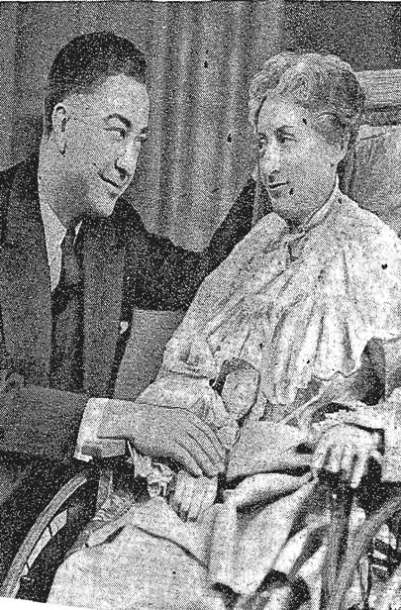"End of Summer" By S.N. Behrman
( Looking Up at Down readings February 25-28)

Publicity still from the New York opening of "End of Summer" in 1936
S.N. Behrman’s 1936 play End of Summer is a comedy of upper-class manners revolving around a wealthy heiress and her daughter, and their search for love. While Behrman’s plays were never overtly political or imbued with social messages, his plays illuminate the society of the American rich in the pre-World War II period.
Paula brings her radical working-class boyfriend Willand his blunt college friend, Dennis, to the family summer home in Northern Maineto meet her mother Leonie. Meanwhile, Leonie has invited some of her male admirers up to the house as well: a moody Russian aristocrat, Count Mirsky, in exile since the Communist Revolution, and a sinister and mysterious psychoanalyst, Dr. Kenneth Rice. Also on hand is Sam, Paula’s father, who has come to finally file divorce papers, as he would like to remarry. While visiting, Will proposes to Paula, but she soon realizes that her wealth poses a huge dilemma: it could provide the necessary funds for Will and Dennis to publish their radical newspaper, but at the same time, the economic boon would ruin Will’s credentials as a voice of the working masses. Paula has other worries too: Kenneth is wooing her mother so that he can use the family fortune to support his own research, while expressing his sexual attraction to Paula. Paula tricks Kenneth into confessing his readiness to throw Leonie over for her within earshot of her mother. Kenneth is ejected from the house, but not before he angrily denounces the family for their weakness in a monologue that seems to suggest that Kenneth is a fascist. Leonie and Paula ruminate on how their wealth makes it difficult to find real love and true interpersonal connection. The play ends when Leonie sends Paula off to New York, to follow real love and mend her relationship with Will.
Behrman’s play was produced by The Theatre Guild, and opened in Hartford, Connecticut on January 30, 1936 after much advance anticipation. It played one night in Hartford, then one night in New Haven, moving to the Colonial Theatre in Boston on February 3, 1936, and finally to the Guild Theatre in New York City on February 17, 1936 .End of Summer ran for 153 performances, and was revived the next year. The piece was received favorably for its “sparkling dialogue” and its comic pacing. Brooks Atkinson, writing for The New York Times on February 18, 1936, called the production one of Behrman’s “tolerant, witty, gently probing essays in modern thinking,” praising the production for “a fluent and sunny performance” and thanking Behrman for “a civilized evening.” End of Summer was even one of five finalists considered for the Critic’s Award, an annual award recognizing the season’s best Broadway play, given by the New York Drama Circle.
However, there was some question, in subsequent years, regarding Behrman’s seemingly apolitical plays—it no longer seemed appropriate not to take a political stand as the war in Europe raged on. Behrman, with his Harvard and Columbia education, wrote plays about the Depression and the onset of World War II, but through the lens of the privileged class, whose wealth—as Leonie tells Paula in End of Summer—had become a burden, making their lifestyle uncomfortably conspicuous. Behrman’s trademark convention in his plays was to bring together characters with opposing views about the world and let them talk through their positions, though these philosophical conversations are frequently separate from the action of the play (for example, in End of Summer, Kenneth’s monologue, which smacks of fascism, has little to do with the events of his failed marriage plot).
Yet Behrman’s plays are not completely devoid of political message. Characters like Kenneth Rice and Behrman’s other fascistic “Strong Men” are meant to be unpleasant and unsympathetic characters, even if Behrman stops short of condemning or punishing them in his plays. Writing for the journal College English in 1950, Charles Kaplan describes the politics of Behrman’s plays as “confused,” and claims that the reason for the “uneven” feeling of so many of Behrman’s plays lies in the conflict of Behrman’s comic sensibility with his “powerful social consciousness” (318). Kaplan suggests that Behrman’s conscience would be better satisfied if the playwright wrote satirical plays, yet describes this unevenness as an accurate representation of the incongruities of American thought in the period. Not all Americans were, like Will and Dennis, fired with a pure radical leftism. The value of Behrman’s play today—and all those rave reviews that thanked Behrman for being “civilized” and “keeping his temper” in an angry time—is that it records the ambivalence and uncertainty that characterized political and social consciousness the Depression era’s privileged class. To retain and revisit such a script today widens the scope of understanding of America in the 1930s.
Copyright (c) 2009, Sarah Guthu
"End of Summer"
By S.N. Behrman
Directed by Mark Jenkins
February 25-27, 7:30 pm; February 28, 2:00 pm
The Floyd and Delores Jones Playhouse | 4045 University Way NE
For more information and to buy tickets, see the UW School of Drama website.
